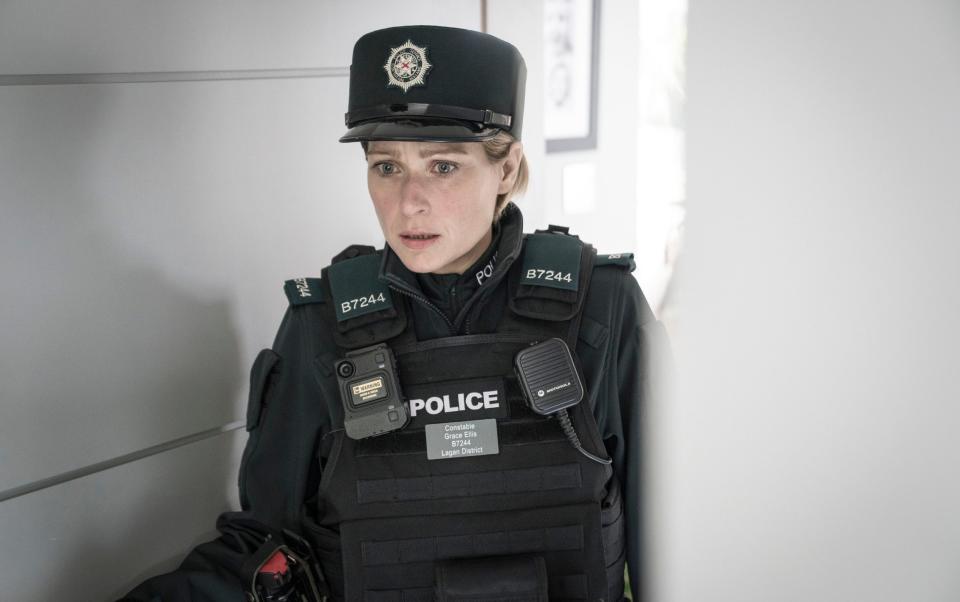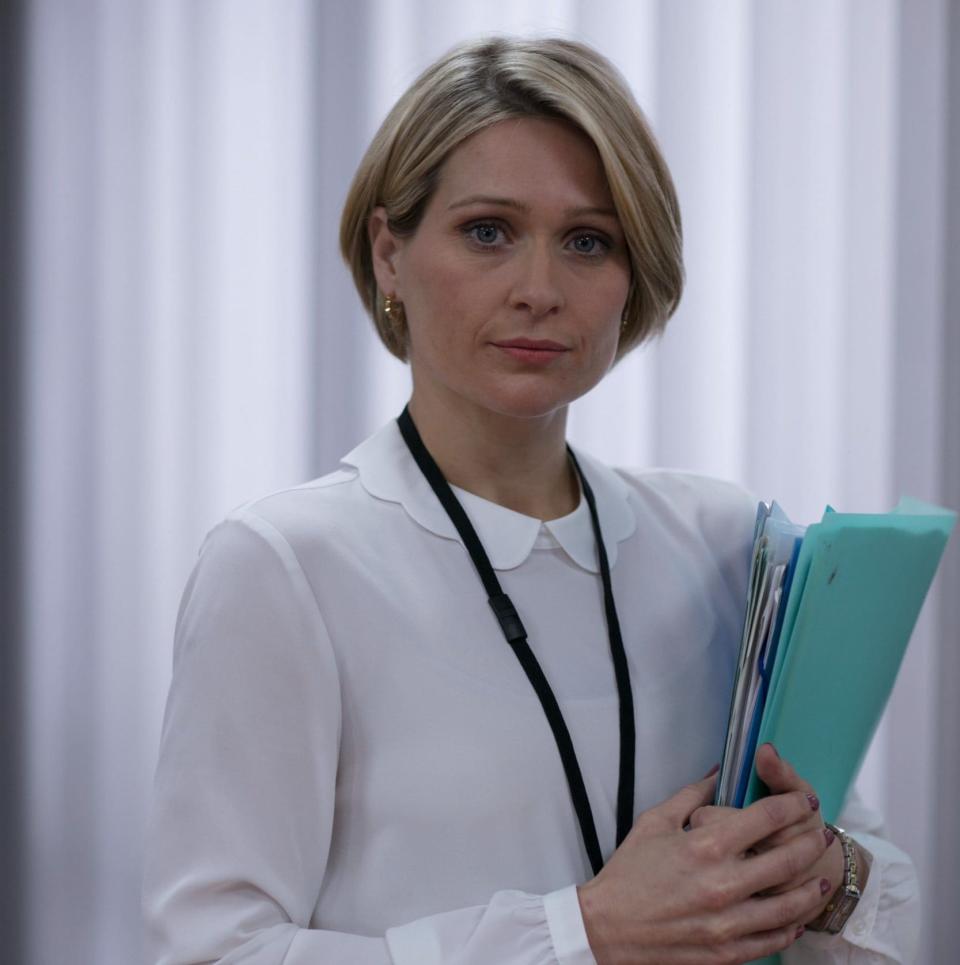Blue Lights star Sian Brooke: ‘We’re reflecting the reality of policing – good and bad’

"I saw a lot of my dad in her – his goodness, his strong moral compass.” Sian Brooke isn’t the first actress in recent months to play a tough female copper in a prime-time BBC drama, but she’s likely the first who can base the character on her own father. Brooke’s dad, from New Quay in west Wales, was a police officer in Lichfield, Staffordshire, where Brooke grew up. “His job was part of the fabric of my life,” she says, “the uniform, the calls in the middle of the night, the responsibility.”
Brooke Sr will likely see a lot that he recognises in his daughter’s latest drama, Blue Lights. Written by Declan Lawn and Adam Patterson – the former Panorama journalists who wrote The Salisbury Poisonings and The Undeclared War – it is a strenuously researched, stomach-churning immersion into frontline policing in Belfast, as we follow a gaggle of green recruits cutting their teeth in a city still infused with sectarianism and, seemingly, a distrust of the police. Brooke’s PC Grace Ellis stands out – she’s a 40-year-old former social worker from England, learning the ropes alongside fresh-faced 20-year-olds.
Brooke, 43, has seen her TV career blossom since her eye-catching, shape-shifting 2017 performance as the malevolent Eurus Holmes in Sherlock. Since then she has starred in a string of high-profile dramas, including Doctor Foster, Guilt and The Moorside. Previously she had been better known for a series of acclaimed stage performances, from Shakespeare (Juliet, Ophelia, Cordelia) to working with Mike Leigh, David Hare and Neil LaBute.
Her highest profile job to date was a brief but spectacular appearance in HBO’s Game of Thrones spin-off House of the Dragon. Her Queen Aemma Arryn died in episode one, horrifically, thanks to a “medieval” caesarean section, causing some viewers to suggest the show, as with Game of Thrones, had a “problem” with women. “It showed the brutality of that world,” says Brooke, “you can’t say that sort of thing didn’t exist. Women in those societies were baby-making machines.”

The world of Blue Lights is also brutal, as the trainee coppers get spat at, punched and bottled, receive death threats, and come up hard against criminals who know the law far better than they do. Grace’s armour against all this is her idealism, a belief that she can heal fractured lives and, ambitiously, a fractured city. Brooke believes that Grace’s “naivety” is her strength, especially when it comes to ancient sectarian grudges. “Sometimes you can know too much, you can dissect it too much, and that can stop any action. People get cynical. But Grace is on a mission to fix people.” Needless to say, she has mixed results in her first few weeks on the beat.
Heroic coppers, however, are not exactly de rigueur. Despite Yvette Cooper stating that the country needs a Sgt Catherine Cawood – the no-nonsense heroine of Happy Valley – in every town, public faith in the real-life police force has never been lower. Years of scandal, compounded by the heinous crimes of officers Wayne Couzens and David Carrick (not to mention the many serving officers currently under investigation) has left British policing in disarray.
Certain TV dramas, including the hugely popular Happy Valley, have been accused of “copaganda” – polishing the police’s reputation at a time when they least deserve it. In the US, the makers of the award-winning Brooklyn 99, a knockabout sitcom set in the NYPD, shelved several episodes after the murder of George Floyd, and stated that the show would start to address police brutality.
As the daughter of a principled police officer, Brooke says the current situation makes her “sad”, but that it shouldn’t put viewers off from watching cop shows. “Declan and Adam have researched Blue Lights to the hilt and I think it’s important to reflect reality, to hold a mirror up to where we are – good or bad. With the recent negative events in the police force, I don’t think people should stop making police dramas because of them. Because then that’s some form of censorship, isn’t it? Blue Lights doesn’t glorify anything."
“I was also in the Stephen Lawrence drama,” she adds, referring to the 2021 ITV series Stephen, “and that reflected the whole investigation. There have always been police dramas that show the negatives.” In Stephen, Brooke played perhaps the most demonised police officer in recent history – the former Metropolitan Police Commissioner Cressida Dick, one of several real-life roles she has taken.
While she never met Dick – “I was intrigued about what she might think” – she did work closely with her real-life counterparts when portraying NHS whistleblower Julie Bailey in The Cure and Karen Matthews’s neighbour Natalie Brown in The Moorside. Bailey, also from Staffordshire, went on to become a friend. All three of those dramas showed Brooke’s unerring ability to sink into a role.

Steven Moffat, who worked with Brooke on Sherlock, calls her a “chameleon”. For Eurus Holmes she had to play several “characters” without the audience twigging that all of them were the same person. “Sian can be more or less anyone,” Moffat says. “She’s very pretty, but she’s got a face that can become any face – with no disguise, no prosthetics. It’s an immense technical challenge and not every brilliant actor can do it.” Sherlock’s casting agent, Kate Rhodes James, called Brooke an “undiscovered powerhouse”.
Although Brooke is often cast as steely, uncompromising characters, in person she has a distinctly laid-back demeanour, chatting on a hotel sofa, her dachshund Ziggy curled up at her feet. Brooke, who lives in the capital with her theatre director husband, Bill Buckhurst, and their two young boys, laughs at the idea that people might see her as tough: “I’m such a soppy, sensitive sort,” she says. “Maybe people think I’m a cow…”
Shortly before I spoke to Brooke, the actress Jessica Barden had upbraided The Crown’s Emma Corrin for saying that she wanted to star in a “gritty” Scottish film with “an outrageous accent”. Barden called this out as “working-class tourism” by a “posh actor”. Does Brooke, from a working-class background herself, believe that certain actors should shy away from certain roles? “My honest opinion is that we’re actors,” she says. “I’m a pretender. That’s my job. Why should people be limited by where they’re from? Whether I should play someone who is really posh or vice versa?”

Brooke highlights the fact that access to the industry is increasingly difficult thanks to rising costs and a lack of opportunity. “If it was more equal in terms of allowing people from less well-off backgrounds to get into the art, it would be less of an issue. And then everybody could play whatever blooming part they want. No, there’s no Us versus Them. I just wish there was a level playing field.”
Brooke’s own career, she points out, might not have happened today. The local arts centre where she watched a friend perform, and first decided she wanted to become an actress, has been knocked down and turned into flats. “The centre was a hub of activity, local bands, everything. I did every blimming show I could – youth theatre, musicals, Shakespeare in the Park. And they bulldozed it.”
Brooke wanted to attend Rada, but didn’t believe she’d get in: “It’s the Royal Academy.” It was watching Maxine Peake, then an aspiring working-class actress, in a 1996 episode of The South Bank Show which followed her as she auditioned for a place at Rada, that gave Brooke the confidence that she should apply. “Everything has got more expensive now and I don’t think the arts is as appreciated as it should be. It needs to be funded, it needs to be cherished.” It’s a persuasive argument from an acting powerhouse whose stature grows with every performance. The copper’s daughter from Lichfield is doing her old man proud.
Blue Lights is on BBC iPlayer now
Sian Brooke was photographed by The Telegraph at The Goodenough Hotel in London


